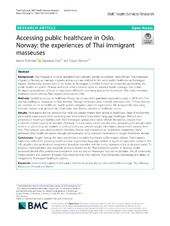| dc.contributor.author | Tschirhart, Naomi Anne | en_US |
| dc.contributor.author | Diaz, Esperanza | en_US |
| dc.contributor.author | Ottersen, Trygve | en_US |
| dc.date.accessioned | 2020-08-13T13:10:01Z | |
| dc.date.available | 2020-08-13T13:10:01Z | |
| dc.date.issued | 2019-10-21 | |
| dc.Published | Tschirhart NA, Diaz E, Ottersen T. Accessing public healthcare in Oslo, Norway: The experiences of Thai immigrant masseuses. BMC Health Services Research. 2019;19:722 | eng |
| dc.identifier.issn | 1472-6963 | |
| dc.identifier.uri | https://hdl.handle.net/1956/23749 | |
| dc.description.abstract | Background: Thai massage is a highly gendered and culturally specific occupation. Many female Thai masseuses migrate to Norway as marriage migrants and as such are entitled to the same public healthcare as Norwegian citizens. Additionally, anyone who is not fluent in Norwegian is entitled to have an interpreter provided by the public healthcare system. Norway and most other countries aspire to universal health coverage, but certain immigrant populations continue to experience difficulties accessing appropriate healthcare. This study examined healthcare access among Thai migrant masseuses in Oslo. Methods: Guided by access to healthcare theory, we conducted a qualitative exploratory study in 2018 with Thai women working as masseuses in Oslo, Norway. Through semi-structured in-depth interviews with 14 Thai women, we explored access to healthcare, health system navigation and care experiences. We analyzed the data using thematic analysis and grouped the information into themes relevant to healthcare access. Results: Participants did not perceive that their occupation limited their access to healthcare. Most of the barriers participants experienced when accessing care were related to persistent language challenges. Women who presented at healthcare facilities with their Norwegian spouse were rarely offered interpreters, despite their husband’s limited capacity to translate effectively. Cultural values inhibit women from demanding the interpretation services to which they are entitled. In seeking healthcare, women sought information about health services from their Thai network and relied on family members, friends and contacts to act as informal interpreters. Some addressed their healthcare needs through self-treatment using imported medication or sought healthcare abroad. Conclusions: Despite having the same entitlements to public healthcare as Norwegian citizens, Thai migrants experience difficulties accessing healthcare due to pervasive language barriers. A significant gap exists between the official policy that professional interpreters should be provided and the reality experienced by study participants. To improve communication and equitable access to healthcare for Thai immigrant women in Norway, health personnel should offer professional interpreters and not rely on Norwegian spouses to translate. Use of community health workers and outreach through Thai networks, may also improve Thai immigrants’ knowledge and ability to navigate the Norwegian healthcare system. | en_US |
| dc.language.iso | eng | eng |
| dc.publisher | BioMed Central | eng |
| dc.rights | Attribution CC BY | eng |
| dc.rights.uri | http://creativecommons.org/licenses/by/4.0/ | eng |
| dc.title | Accessing public healthcare in Oslo, Norway: The experiences of Thai immigrant masseuses | en_US |
| dc.type | Peer reviewed | |
| dc.type | Journal article | |
| dc.date.updated | 2020-01-29T07:18:34Z | |
| dc.description.version | publishedVersion | en_US |
| dc.rights.holder | Copyright 2019 The Authors | |
| dc.identifier.doi | https://doi.org/10.1186/s12913-019-4560-9 | |
| dc.identifier.cristin | 1746082 | |
| dc.source.journal | BMC Health Services Research | |

